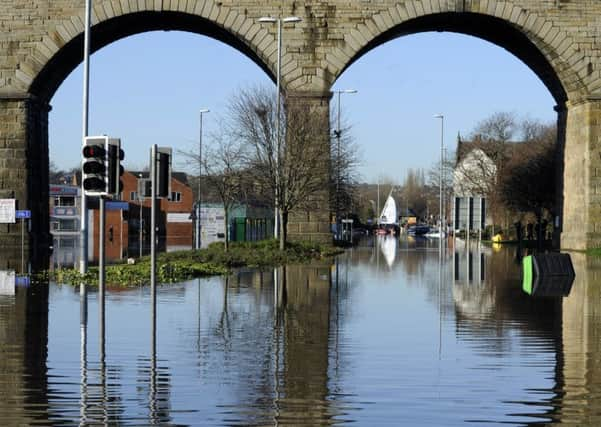YP Comment: False economy on floods farce. Sink or swim over insurance


Take Pulman Steel in the Calder Valley town of Sowerby Bridge. Given the full hi-vis treatment when Mr Osborne, resplendent in his trademark hard hat, dropped in for a pre-election visit in April 2015, it has effectively been abandoned by the Government since last December’s floods.
Even though Mr Cameron told MPs in April that the Government was looking to secure affordable insurance cover for businesses in flood-hit areas, the evidence suggests otherwise. Now back in business, 10 firms rejected Pulman’s application for insurance cover before then firm’s original underwriters agreed a deal – subject to a £50,000 excess and the firm meeting half of the cost of a £250,000 package of improvements which have been submitted to the Environment Agency for approval.
Advertisement
Hide AdAdvertisement
Hide AdIt’s a mammoth undertaking. And this is a company endorsed by the then Chancellor because of its prestige and wider importance to Yorkshire manufacturing and engineering. What about the one-person operation further down the Calder Valley which has been flooded repeatedly? Who is speaking up for them? Or are they having to risk all – and go without insurance cover in the knowledge that another flood will be terminal to their business survival chances?
This is not an isolated example. In Leeds, a flooded business in Kirkstall has been reportedly rejected by 13 insurers and the emptiness of Mr Cameron’s words were revealed in the Commons last month when Rory Stewart, the then Floods Minister, acknowledged the policy difficulties before implying that “investment in flood defences” is the best solution. It begs this question – who foots the bill? Taxpayers or those firms which find themselves at the mercy of nature through no fault of their own? A water-tight policy would be a start rather than a false economy which does not honour the last Government’s debts to Yorkshire flooding victims.
Rates of return
FOR many, the reduction of interest rates to a record low of 0.25 per cent will be a double-edged sword. It penalises savers – the very people who have tried to be responsible and live within their means – while being indicative of the economic uncertainty as the UK prepares to leave the European Union.
Yet lower borrowing costs should, on the other hand, make Britain a more attractive investment proposition and both the Government and the Bank of England will be hoping this stimulus does, in fact, signify that the country is open for business.
Advertisement
Hide AdAdvertisement
Hide AdTime will tell – the Autumn Statement later this year will be one of the most critical in living memory and it would be prudent of Philip Hammond, the newly-appointed Chancellor, to consider an acceleration in planned reductions to corporation tax to less than 12.5 per cent, the current rate in Ireland.
Why? If Britain is to withstand the upheaval of Brexit, and emerge as an even stronger economic force on the world stage, the country should offer the most competitive taxes in Europe in order to attract new businesses and investors in sufficient numbers. If this happens, tax revenues should not be compromised and it should then be possible to raise interest rates again.
8am watershed: Last orders to early morning drinking
THE airline Jet2.com needs no lectures about the safety threat from drunken passengers – it has just imposed a lifetime ban on Joshua Strickland, 21, of Tadcaster, after his aggressive behaviour led to a flight being diverted.
Such incidents have prompted the Leeds-based airline to ban the sale of alcohol before 8am on its flights and this is a necessary first step to changing the drinking culture which has become increasingly prevalent when people do choose to fly.
Advertisement
Hide AdAdvertisement
Hide AdLet’s hope that others follow suit, not because it is the role of airlines to be ‘party poopers’ but simply to send out a strong message that inebriated travellers can expect the full consequences of the law if their recklessness and irresponsibility compromises others. The buck stops with the passengers themselves, a plain fact that has become blurred because the drunken antics of a tiny minority were accepted, and tolerated, by the aviation industry for far too long.